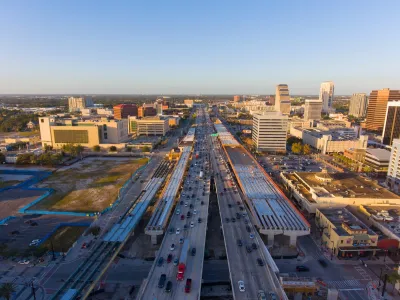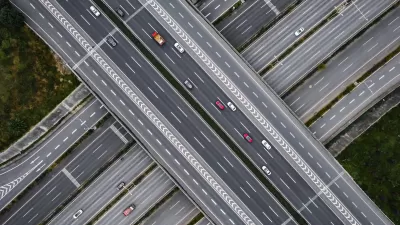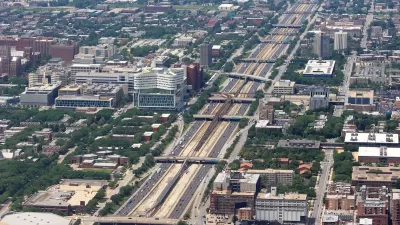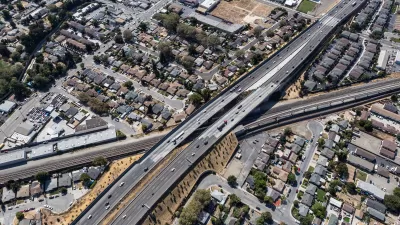Research from 50 major U.S. cities shows social connections are weakest in neighborhoods where highways are present.

A new study quantifies just how much urban freeways disrupt social networks, reports Eliana Perozo in Next City. The study assessed social connectivity in the 50 biggest U.S. cities and found the least social connections in neighborhoods with freeways.
This comes as no surprise to planners and advocates who have, for decades, underscored the negative impacts of highways on neighborhoods. By the U.S. Department of Transportation’s own estimates, interstates have displaced over one million people.
According to one of the study’s authors, “highways connect over long distances, but divide over short ones.” The study found examples of freeways that act as barriers both between communities of different races and intraracially. “Nashville’s I-40 – which split up a vibrant middle-class Black neighborhood, displacing about 80% of Nashville’s Black businesses, more than 600 homes and close to 1,500 people – is one of many such cases.”
Luca Aiello, lead author of the study, explained how this can translate into economic loss: “[Highways] limit social opportunities, and those social opportunities are connected directly to financial opportunities.”
In acknowledgement of the social, economic, and public health impacts of freeways, the federal Reconnecting Communities program was created under the 2021 Infrastructure Investment and Jobs Act to fund projects such as freeway removals and cap parks. Its future under the current administration, which rescinded USDOT guidelines that addressed equity, is unclear.
FULL STORY: Highways Block Social Connection. A New Study Shows Just How Much.

Planetizen Federal Action Tracker
A weekly monitor of how Trump’s orders and actions are impacting planners and planning in America.

Congressman Proposes Bill to Rename DC Metro “Trump Train”
The Make Autorail Great Again Act would withhold federal funding to the system until the Washington Metropolitan Area Transit Authority (WMATA), rebrands as the Washington Metropolitan Authority for Greater Access (WMAGA).

The Simple Legislative Tool Transforming Vacant Downtowns
In California, Michigan and Georgia, an easy win is bringing dollars — and delight — back to city centers.

In These Cities, Most New Housing is Under 441 Square Feet
With loosened restrictions on “micro-housing,” tiny units now make up as much as 66% of newly constructed housing.

Albuquerque’s Microtransit: A Planner’s Answer to Food Access Gaps
New microtransit vans in Albuquerque aim to close food access gaps by linking low-income areas to grocery stores, cutting travel times by 30 percent and offering planners a scalable model for equity-focused transit.

This City Will Pay You to Meet Your Neighbors
A North Kansas City grant program offers up to $400 for residents to throw neighborhood block parties.
Urban Design for Planners 1: Software Tools
This six-course series explores essential urban design concepts using open source software and equips planners with the tools they need to participate fully in the urban design process.
Planning for Universal Design
Learn the tools for implementing Universal Design in planning regulations.
Smith Gee Studio
City of Charlotte
City of Camden Redevelopment Agency
City of Astoria
Transportation Research & Education Center (TREC) at Portland State University
US High Speed Rail Association
City of Camden Redevelopment Agency
Municipality of Princeton (NJ)





























